Case Law Details
SRS Mining Vs DCIT (Madras High Court)
In the considered view of this Court, stated position of the Revenue, which has been captured supra more particularly, the stated position that the sworn statements are not going to be used against the writ petitioner as set out in the counter affidavit and as captured in this order elsewhere supra by itself douses the request for cross-examination. In other words, it draws the curtains on the request for cross-examination.
If statements are not going to be used against the writ petitioner, it cannot be gainsaid that the persons, who made the sworn statements have to be cross-examined. Therefore, it is not necessary to further dilate into ‘NJP’ [‘Natural Justice Principle’].
FULL TEXT OF THE JUDGMENT/ORDER OF MADRAS HIGH COURT
This order will govern the captioned writ petition and ‘Writ Miscellaneous Petition’ (‘WMP’) therein.
2. Read this in conjunction with and in continuation of earlier proceedings made in the previous listing on 23.09.2021, which reads as follows:
‘Mr.Mukul Rohatgi, learned Senior Advocate instructed by learned counsel on record for the writ petitioner Mr.Vaibhav R.Venkatesh, and Mr.A.P.Srinivas, Senior standing counsel for the lone respondent (learned Revenue counsel) are before this Court.
2. The captioned writ petition pertains to assessment in a case of search/requisition under Section 153-A of the ‘Income-Tax Act, 1961′ [hereinafter ‘IT Act’ for the sake of brevity, convenience and clarity].
3. The above takes us to Sections 142 and 143 of IT Act, is learned Revenue counsel say.
4. Be that as it may, prayer in the captioned writ petition is in two parts. One part or in other words, the first limb of the prayer pertains to a Mandamus qua respondent to act on four communications dated 29.07.2019, 18.02.2021, 05.04.2021, 06.05.2021. To be noted, according to the learned senior counsel for the writ petitioner, these are representations made by the writ petitioner on the contrary, learned Revenue counsel submits that these are in response to certain communications sent by the writ petitioner in the course of assessment. The second limb of the prayer pertains to permission to examine/cross examine a list of persons adumbrated in Schedules A and B and providing documents enlisted in Schedule C. This Court is informed that reference to Schedules A, B and C are as set out in page Nos.14 to 19 of the writ affidavit, prayer in main writ petition and those three schedules read as follows:
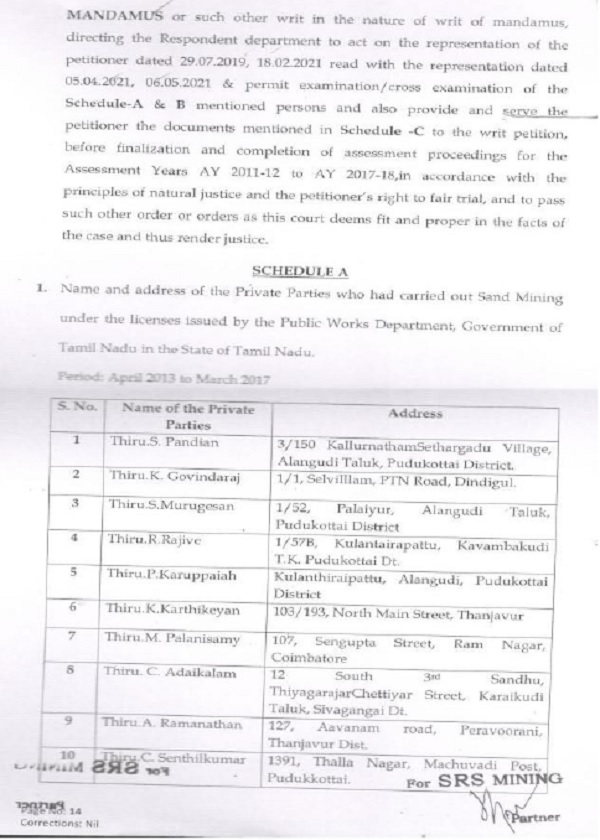
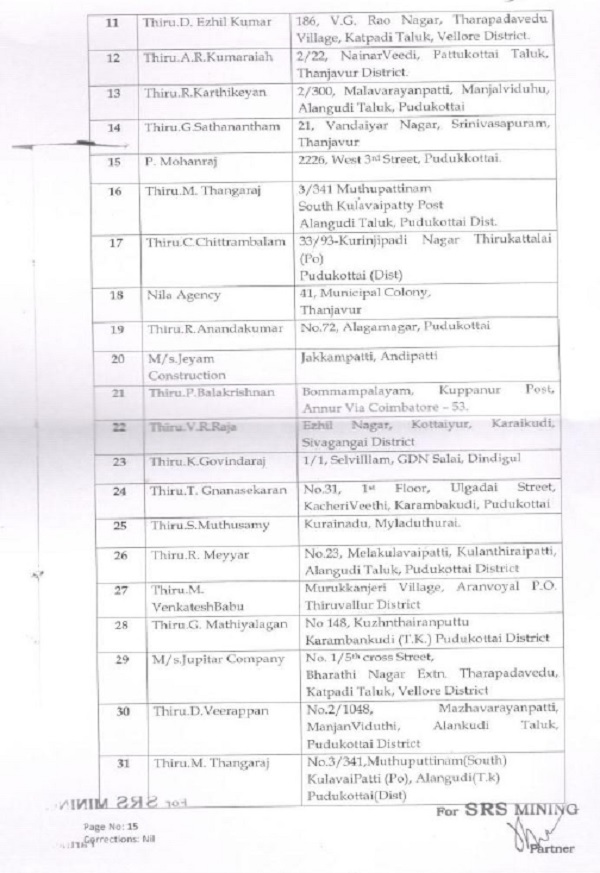
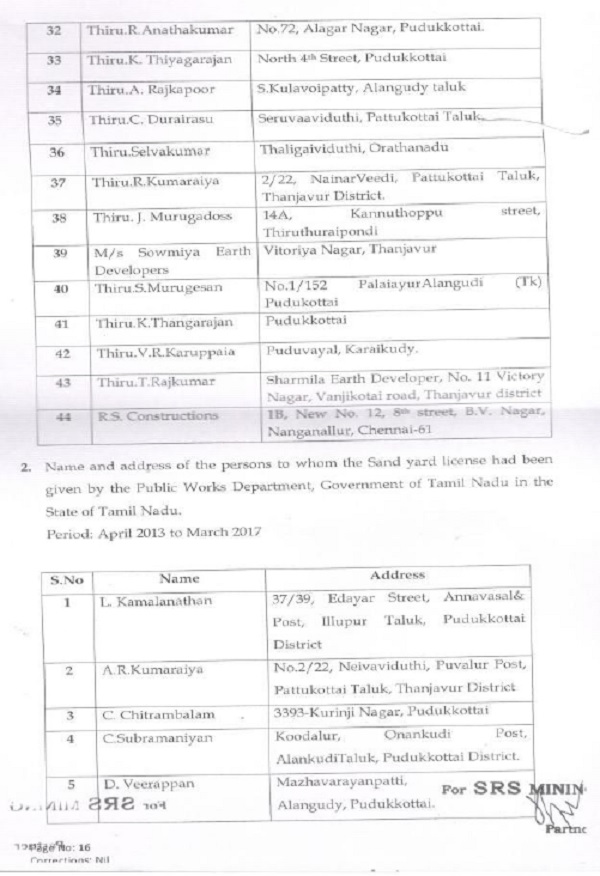
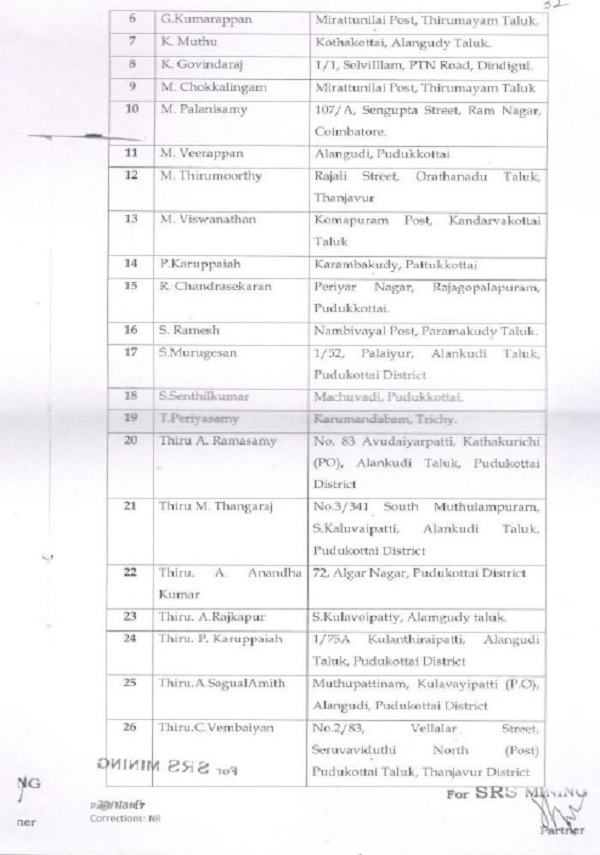
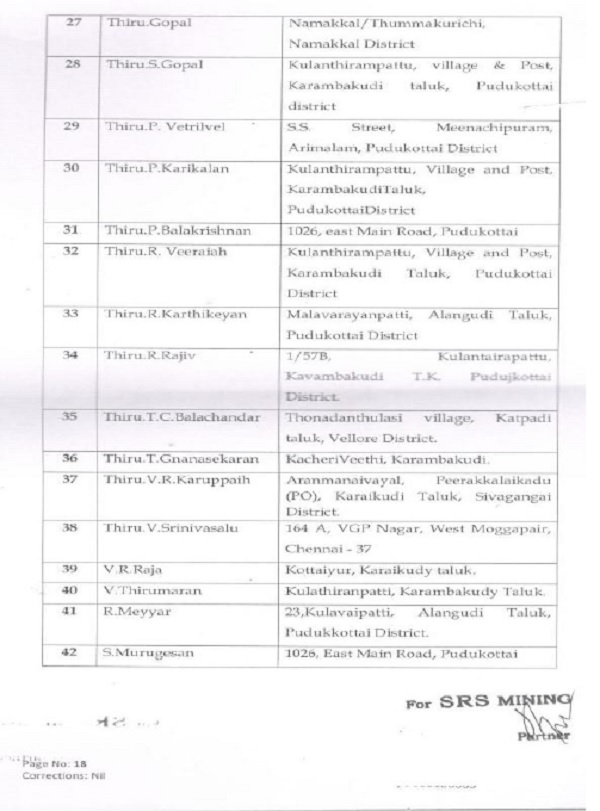
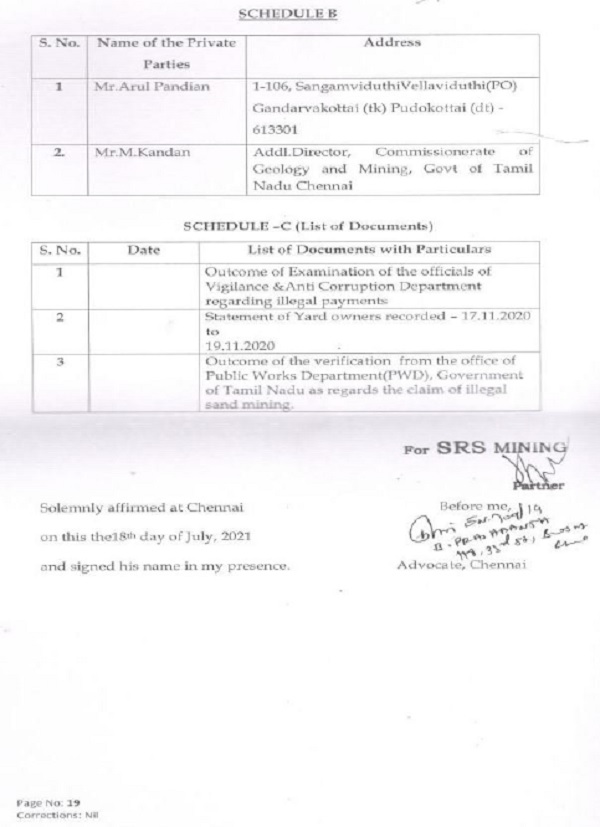
5. Ideally, the Schedules should have been annexed to the writ petition but it has set out in the writ affidavit. I have at that in this case on hand in the hope that such procedural lapses do not recur.
6. In the course of the hearing, from the case file placed before this Court, it came to light that the communications dated 29.07.2019, 18.02.2021, 05.04.2021, 06.05.2021 may not qualify as representations as rightly pointed out by learned Revenue counsel. Be that as it may, on perusal of the contents of the four communications, learned senior counsel in his usual fairness submitted that the same do not talk about cross examination. Therefore, this puts an end to the first limb of the writ prayer and leaves us with the second limb of the prayer alone.
7. Responding to the second limb of the prayer, learned Revenue counsel submitted that the answer to Schedule A, Schedule B and Schedule C are contained in page Nos.17, 23 and 25 respectively of the counter affidavit and the relevant portions read as follows:
Page No.17:
‘In this para, the Petitioner Firm alleged that the Respondent had not responded to the petition dated 23.10.2020. It has also been alleged that the persons referred in the Special Audit would atleast to be examined. It has further been alleged that the respondent is attempting to rely upon the materials collected from the persons mentioned in the Schedule and express apprehension.
The apprehension expressed by the Petitioner Firm is unfounded and self imposed apprehension. In the letter dated 23.01.2020, the petitioner firm requested to cross examine the sand yard owners under the impression that the sand yard owners furnished statement against the Petitioner Firm. The department has issued summons to 26 Sand yard owners and all of them appeared and statement was recorded from them. All the Sand yard owners have submitted that they had no knowledge about the Petitioner Firm. In this background, the department has not taken any stand to bring it against the Petitioner Firm. In this background, the Petitioner’s Firm letter, requesting cross examination of the Sand yard owners was not taken up for consideration. In view of this, the allegation of the Petitioner Firm that the department was dilly-dallying upon the issue is totally baseless.’
Page No.23.
‘In respect of cross examination of persons mentioned in the Schedule-B
In this schedule, the Petitioner Firm requested to allow the cross examination of Shri C.Arul Pandi and Shri M.Kandhan, A.D.(Mines).
Cross examination of Shri C.Arul Pandi.
On 06.08.2019, a summon u/s.131 of the Act was issued to Shri C.Arul Pandi requesting him to appear on 19.08.2019. On the same day, a letter was issued to the Petitioner Firm requesting to come and cross examine Shri C.Arul Pandi on 19.08.2019.
On 19.08.2019, a letter was received from Shri C.Arul Pandi seeking adjournment by citing his health condition. On 20.08.2019, one more summon u/s.131 of the Act was issued to Shri C.Arul Pandi posting the case for hearing on 27.08.2019. On this date, Shri Dinesh, Advocate appeared on behalf of Shri C.Arul Pandi and filed a letter from his client and sought for adjournment. On the same day, the representative of the assessee appeared for cross examine before the respondent on 20.09.2019. On this date, there was no response. It is the Petitioner Firm under whom Shri C.Arul Pandi has worked. The Petitioner Firm has not taken any step to produce Shri C.Arul Pandi before the Respondent. However, the Petitioner Firm is requesting the Department to allow the cross examination of Shri C.Arul Pandi as if Shri C.Arul Pandi is under the control of the Department. In this background, Shri C.Arul Pandi was not examined. There may be a plea that Shri C.Arul Pandi was not an employee of the Petitioner Firm. While recording the statement, Shri C.Arul Pandi has admitted that he has worked for three years under the same management (Petitioner Firm).
Since Shri C.Arul Pandi was not subjected to cross examination, it has been proposed not to rely on his statement solely but, to use as a supporting evidence in respect of the materials seized and observation made in the proposed assessment in the Petitioner Firm. The Petitioner Firm is at liberty to agitate in the event if it has been solely relied in the assessment in the Appellate proceedings.
Thus, it is submitted and prayed to this Hon’ble Court that the request of the Petitioner Firm to allow the cross examination of Shri C.Arul Pandi may not require any consideration and the same requires to be rejected.
Cross examination of Shri M.Kandhan:
During the course of post search proceedings, Statement u/s.131 of the Act was recorded from Shri M.Kandhan, A.D. (Mines) on 11.08.2017. In the statement recorded, he has simply stated about the issue of Sand yard licenses about the persons identified by the partners of the Petitioner Firm. Nothing more was recorded from him. He deposed the statement in his official capacity. His statement proposed to use only to strengthen the seized material and the observations made. His statement is not proposed to be relied upon heavily and solely. In the assessment order, it has been proposed to use it only strengthen the order. Even in the event, if Shri M.Kandhan retracts the statement, it will have no impact in determining the total income of the Petitioner Firm.’ Page No.25:
‘List of documents required as per Schedule-C:
a. Outcome of examination of officials of vigilance and Anti Corruption Department.
The respondent has referred the matter to the Department of Vigilance and Anti Corruption regarding illegal payments only to take appropriate action. The respondent has never examined the officials of Vigilance and Anti Corruption. In view of this, the question of requesting the documents relating to outcome of examination of officials of Vigilance and Anti Corruption will not arise.
b. Statement of Yard owners:
In response to the summons issued u/s.131 of the Act, 26 Sand yard owners appeared and answered that they had no knowledge about the Petitioner Firm. When the Sand yard owners have explicitly admitted that they had no knowledge about the Petitioner Firm and the Department has not proposed to utilize the same in the proposed assessment order and furnishing the copy of the same to the Petitioner Firm will serve any purpose.
c. Outcome of the verification from the office of the Public Works Department about illegal Sand Mining:
The Public Works Department has categorically denied about the existence of illegal sand mining. The Department is not proposed to utilize about the verification in the proposed assessment order. In view of this, furnishing of verification report to the Petitioner Firm will serve any purpose.’
8. The above is the stated position of the revenue is learned Revenue Counsel say.
9. Notwithstanding the above stated position of the Revenue, learned senior counsel drew the attention of this Court to a communication dated 20.11.2020 from the respondent Department. To be noted, this communication is from the Deputy Commissioner of the Income Tax and the counter affidavit which is now before this Court has been sworn to by a Assistant Commissioner of Income Tax. This Court is informed by the learned Revenue counsel that the author of 20.11.2020 letter (Deputy Commissioner) and the deponent of the counter affidavit (Assistant Commissioner) are assessing officers qua writ petitioner in the case on hand, one being the successor of the other. Further to be noted, counter affidavit is dated 10.08.2021.
10. Responding to 20.11.2020 communication, learned Revenue counsel submitted that it is in the course of the assessment. This Court finds that the reference to the 20.11.2020 communication in the writ affidavit is contained in paragraph No.21 and the relevant portion reads as follows:
‘Para 21: This para refers to the request of cross examination of Sand yard owners and request to pass order after examining Executive Engineer, PWD and Additional Director, Mines.
In respect of Sand yard owners, summons were issued to 26 persons and they have responded. All of them have clearly submitted that they had no knowledge about the Petitioner Firm.
In view of the stand taken by all the above Sand yard owners, they were not followed up and their statements have not been proposed to utilize in the assessment orders that may be passed in due course.
Thus, the request to allow the Petitioner to cross examine the Sand yard owners was not taken up for consideration, which will serve no purpose.
In respect of the request of the Petitioner Firm that assessment order may be passed after examining the Executive Engineer of PWD and Additional Director (Mines) about the claim of illegal Sand mining.
The Petitioner Firm cannot direct an Assessing Authority how to complete the assessment. The Respondent is at liberty to follow the materials which he relied upon during the course of assessment proceedings. It is upto the Petitioner Firm to see whether the principle of natural justice is followed or not. Without receiving any order from the Department, it is premature on part of the Petitioner Firm to come at a conclusion that examining the Executive Engineer (PWD) and A.D. (Mines) is basis to determine the illegal mining.
The Income Tax Department is not concerning about the activities of the Petitioner Firm is legal or illegal. It is about the income admitted or not from the bussiness activities.’
11. Adverting to the counter affidavit, learned Revenue counsel submitted that aforementioned paragraph No.21 of the writ affidavit has been met at page No.10 of the counter affidavit and the same reads as follows:
‘Para 21.It is also submitted that on 20.11.2020, the respondent had sent a letter to the petitioner, wherein the respondent had informed the petitioner to examine the yard owners who were examined by the department between 17.11.2020 and 19.11.2020. In this regard, the statements of the yard owners were not given and instead the department gave their own summary of the said statements and called upon the petitioner to examine the yard officials. This course of action is completely alien to the principles of natural justice and shows the actual intent of the respondent to merely give the petitioner a moonshine opportunity to present its case.’
12. At this juncture, this Court was informed that a rejoinder has been filed by the writ petitioner. It is not clear as to what are the new facts that surfaced in the counter affidavit warranting rejoinder. However, that will be examined when the rejoinder is before this Court as the same has not been placed before this Court as part of the case file today.
13. Learned counsel for writ petitioner submits that the rejoinder has been filed vide SR.No.30958 of 2021, dated 25.08.2021. Registry to put up the same as part of the case file in the next listing. List this matter one week hence. List on 28.09.2021.’
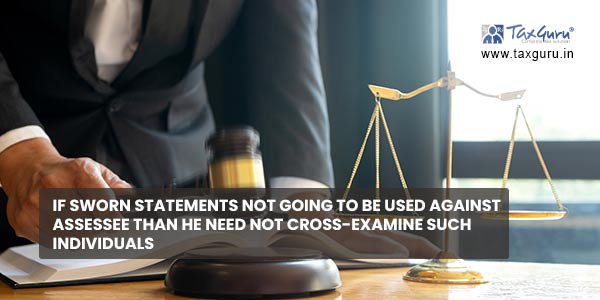
3. Today Mr.Vaibhav R.Venkatesh, learned counsel for writ petitioner and Mr.A.P.Srinivas, learned senior standing counsel (Revenue Counsel) assisted by Mr.A.N.R.Jayapratap, learned junior standing counsel for the lone respondent are before this virtual Court.
4. Adverting to the aforementioned earlier proceedings made in the previous listing on 23.09.2021, learned counsel for writ petitioner submits that in paragraph 6 in the reference to the four representations, the submission of learned Senior counsel for writ petitioner that 29.07.2019 representation also does not talk about cross-examination is factually incorrect and this was owing to the difficulty in not being able to physically present to instruct the Senior counsel. Perusal of first representation dated 29.07.2019 (page no.108 of typed set of papers) makes it clear that it does talk about cross-examination. This submission is recorded. However, it is made clear that the view of this Court that all the four communications do not qualify as representations as rightly pointed out by Revenue counsel stands. In all other aspects, both learned counsel submit that the factual aspects have been correctly captured in the earlier proceedings dated 23.09.2019 (extracted and reproduced supra).
5. In continuation of earlier proceedings, rejoinder filed by the writ petitioner has been placed before this Court. Continuing the submissions made in the previous listing, learned counsel for writ petitioner drew the attention of this Court to pages 50 and 80 of typed set of papers and submitted that there is a clear mention about the two individuals mentioned in Schedule B, their statements are per se adverse to the writ petitioner and therefore, writ petitioner should be permitted to be cross-examine them. Answer to the above, i.e., answer to the statements of the two individuals mentioned in Schedule B being adverse to the writ petitioner is met in the counter affidavit in pages 8 to 10. Regarding one of them, averments in the counter affidavit are as follows:
‘Shri Arul Pandi was an accounts incharge of Kappur Sand yard at Villupuram. A statement u/s.132(4) was recorded from him on 03.02.2017. To provide a cross examination of Shri Arul Pandi, a summon u/s.131 of the Act was issued on 06.08.2019 with a request to appear on 19.08.2019 for cross examination. On 19.08.2019, a letter wa received from Shri Arul Pandi seeking adjournment by citing his health reasons. On 20.08.2019, one more summon u/s.131 of the Act was issued to Shri Arul Pandi posting the case for hearing on 27.08.2019. On this date, Shri Dinesh, Advocate, appeared on behalf of Shri Arul Pandi and filed a letter seeking adjournment. On the same day, the representative of the Petitioner appeared for cross examination of the witness. Since Shri Arul Pandi was not appeared, cross examination was not allowed. A letter was issued to the Petitioner on 12.09.2019 requesting to produce Shri Arul Pandi for cross examination on 20.09.2019. Inspite of repeated request and summon issued, Shri Arul Pandi was reluctant and failed to appear and thereby, cross examination was not allowed.
Shri Arul Pandi is a native of Pudukottai district where, one of the partners of Petitioner Firm, Shri.S.Ramchandran belongs to. He was incharge of Kappur Sand yard at the time of search and prior to this, he worked in other sand yards of the same management group. Thus, obviously, he was an employee and under the control of Petitioner Firm. It is upto the Petitioner Firm to produce Shri Arul Pandi before the Department and allow him for any kind of examination.
It is unfair on the part of Petitioner to call for the cross examination of a person who is their own employee and reluctant to appear for cross examination. In this background, Shri Arul Pandi was not examined.’
6. Answer to the other individual in Schedule B is contained in pages 9 and 10, which read as follows:
‘A statement u/s.131 of the Act was recorded from Shri M.Kandhan, Additional Director of Mines, Commissionerate of Geology of Mining, Chennai on 11.08.2017. He deposed the statement as Additional Director of Mines in his official capacity. His statement is proposed to use only as a reference and his statement cannot form part of basis for determining the total income of the Petitioner Firm.
In the proposed order, certain references and observations of the following entities are proposed to be incorporated.
a. Orders of the Apex Court and High Court
b. Observation of the Settlement Commission
c. Observation of Investigation Wing of the Department
d. Observation of Central Bureau of Investigation
It is not practically possible to subject to cross examination of the above entities other than the Court and Settlement Commission. Their observation was proposed to be cited only to strengthen the case and it is not forming part of the evidence as a basis in arriving the total income of the Petitioner Firm.
At this juncture, it is significant to brought on record about the observation of the Hon’ble High Court of Judicature at Madras in the case of Shri Vivek Papisetty V DCIT, Central Circle-2(4), Chennai (the present Respondent) in W.P.No.11027 of 2019 dated 10.04.2019. The observation is as under:
“The prayer, couched as it is, is not acceptable. There can be no direction to the Income Tax Department to produce any person for cross examination. At best a request may be made by the Petitioner for cross examination, which will be considered in the light of the principle of natural justice and fair play.”
Thus, by considering the facts, the statement of Shri M.Kandhan is not going to be used as a basis for determining the total income of the Petitioner Firm, the request of the Petitioner for allowing the cross examination of Shri M.Kandhan was not considered.’
7. Learned counsel for writ petitioner drew the attention of this Court to judgement of Hon’ble Supreme Court in Andaman Timber Industries Vs. Commissioner of Central Excise reported in (2016) 15 SCC 785. Learned counsel drew the attention of this Court to paragraphs 6 to 8 of this case law, which read as follows:
‘6.According to us, not allowing the assessee to cross-examine the witnesses by the Adjudicating Authority though the statements of those witnesses were made the basis of the impugned order is a serious flaw which makes the order nullity inasmuch as it amounted to violation of principles of natural justice because of which the assessee was adversely affected. It is to be borne in mind that the order of the Commissioner was based upon the statements given by the aforesaid two witnesses. Even when the assessee disputed the correctness of the statements and wanted to cross-examine, the Adjudicating Authority did not grant this opportunity to the assessee. It would be pertinent to note that in the impugned order passed by the Adjudicating Authority he has specifically mentioned that such an opportunity was sought by the assessee. However, no such opportunity was granted and the aforesaid plea is not even dealt with by the Adjudicating Authority. As far as the Tribunal is concerned, we find that rejection of this plea is totally untenable. The Tribunal has simply stated that cross-examination of the said dealers could not have brought out any material which would not be in possession of the appellant themselves to explain as to why their ex-factory prices remain static. It was not for the Tribunal to have guess work as to for what purposes the appellant wanted to cross-examine those dealers and what extraction the appellant wanted from them.
7. As mentioned above, the appellant had contested the truthfulness of the statements of these two witnesses and wanted to discredit their testimony for which purpose it wanted to avail the opportunity of cross-examination. That apart, the Adjudicating Authority simply relied upon the price list as maintained at the depot to determine the price for the purpose of levy of excise duty. Whether the goods were, in fact, sold to the said dealers/witnesses at the price which is mentioned in the price list itself could be the subject matter of cross-examination. Therefore, it was not for the Adjudicating Authority to presuppose as to what could be the subject matter of the cross-examination and make the remarks as mentioned above. We may also point out that on an earlier occasion when the matter came before this Court in Civil Appeal No. 2216 of 2000, order dated 17.03.2005 was passed remitting the case back to the Tribunal with the directions to decide the appeal on merits giving its reasons for accepting or rejecting the submissions.
8. In view the above, we are of the opinion that if the testimony of these two witnesses is discredited, there was no material with the Department on the basis of which it could justify its action, as the statement of the aforesaid two witnesses was the only basis of issuing the Show Cause Notice.’
8. Learned counsel for writ petitioner also went on to say that though Andaman Timber’s case was rendered under Central Excise Act, the principle is being followed in IT Act cases also.
9. An order made by ‘Income Tax Appellate Tribunal’ [‘ITAT’ for the sake of brevity] being order dated 06.11.2018 in Jyoti Gupta Vs. The I.T.O, New Delhi case was also placed before this Court.
10. Discussion regarding aforementioned two case laws will be set out elsewhere in this order.
11. Learned counsel for Revenue, adverting to page no.154 of typed set of papers, elaborated on his submissions captured in the previous listing. Learned Revenue counsel submitted that a notice under Section 142(1) of IT Act being notice dated 14.11.2018 bearing reference C.No.ACLFS6523P/CC 2(4)/2018-19 was issued [Page 45 of typed set of papers]. Writ petitioner responded to the same and it is in this context that 20.11.2020 communication (page 154 of typed set of papers) was issued and that it contains a gist pertaining to the material. In this regard, it was reiterated that this does not mean that the sworn statements of individuals are going to be used against the writ petitioner. In this regard, averments made in the counter affidavit, which have been extracted and reproduced supra were reiterated.
12. In reply, learned counsel for writ petitioner submitted that in a Trial Court scenario, the entire chief examination should be made available and making available the gist will not suffice. Learned counsel also submitted that the position is not any different from the earlier order dated 17.07.2019 made by this Court in WP.No.21166 of 2019.
13. This Court finds that the stated position of the Revenue that the sworn statements are not going to be used against the writ petitioner itself puts an end to the controversy in the captioned matter, regarding 17.07.2019 order, it is a case where request for cross examination is acceded to and therefore, it is more in the nature of a consent order and therefore it does not come to the aid of the writ petitioner in the case on hand.
14. This takes us to Andaman Timber case and Jyoti Gupta case referred to supra.
15. A perusal of facts in Andaman Timber case makes it clear that it was a case where the statements made by the individual was the basis of the impugned order. In the instant case, the stated position of Revenue as captured in the counter affidavit is completely different i.e., bipolar opposite and therefore, Andaman Timber’s case does not come to the aid of the writ petitioner in the case on hand. Likewise, Jyoti Gupta case is also a matter where the statement of the witness was the basis of the impugned order. This is set out in paragraph 13 of Jyoti Gupta case, which reads as follows:
’13. Merely on the strength of statement of third party i.e., Shri Vikrant Kayan cannot justify the impugned additions. Moreso, when specific request was made by the assessee for allowing cross examination was denied by the Assessing Officer. The first appellate authority also did not consider it fit to allow cross-examination. This is in gross violation of the principles of natural justice and against the ratio laid down by the Hon’ble Supreme Court in the case of Andaman Timber Vs. CIT Civil Appeal No.4228 of 2006 wherein it has been held as under:
“According to us, not allowing the assessee to cross-examine the witnesses by the Adjudicating Authority though the statements of those witnesses were made the basis of the impugned order is a serious flow which makes the order nullity inasmuch as it amounted to violation of principles of natural justice because of which the assessee was adversely affected. It is to be borne in mind that the order of the Commissioner was based upon the statements given by the aforesaid two witnesses. Even when the assessee disputed the correctness of the statements and wanted to cross-examine, the Adjudicating Authority did not grant this opportunity to the assessee. It would be pertinent to note that in the impugned order passed by the Adjudicating Authority he has specifically mentioned that such an opportunity was sought by the assessee. However, no such opportunity was granted and the aforesaid plea is not even dealt with by the Adjudicating Authority. As far as the Tribunal is concerned, we find that rejection of this plea is totally untenable. The Tribunal has simply stated that cross-examination of the said dealers could not have brought out any material which would not be in possession of the appellant themselves to explain as to why their ex-factory prices remain static. It was not for the Tribunal to have guess work as to for what purposes the appellant wanted to cross-examine those dealers and what extraction the appellant wanted from them. As mentioned above, the appellant had contested the truthfulness of the statements of these two witnesses and wanted to discredit their testimony for which purpose it wanted to avail the opportunity of cross-examination. That apart, the Adjudicating Authority simply relied upon the price list as maintained at the depot to determine the price for the purpose of levy of excise duty. Whether the goods were, in fact, sold to the said dealers/witnesses at the price which is mentioned in the price list itself could be the subject matter of the cross-examination. Therefore, it was not for the Adjudicating Authority to presuppose as to what could be the subject matter of the cross-examination and make the remarks as mentioned above. We may also point out that on an earlier occasion when the matter came before this Court in Civil Appeal No.2216 of 2000, order dated 17.03.2005 was passed remitting the case back to the Tribunal with the directions to decide the appeal on merits giving its reasons for accepting or rejecting the submissions. In view the above, we are of the opinion that if the testimony of these two witnesses is discredited, there was no material with the Department on the basis of which it could justify its action, as the statement of the aforesaid two witnesses was the only basis of issuing the Show Cause. We, thus, set aside the impugned order as passed by the Tribunal and allow this appeal.”’
16. Before concluding, there are two aspects regarding pleadings. One is, no new facts have emerged and therefore, a rejoinder was for all practical purposes, not necessary in the case on hand. However, learned counsel for writ petitioner submits that the rejoinder was filed on a earlier directive from Court and learned Revenue counsel disputes that. This Court deems it appropriate to leave at that in this case on hand leaving open the question of when rejoinder can be entertained to be decided in another case where it becomes imperative to decide the matter. Likewise in the counter affidavit, as already mentioned, there is a reference to ‘Comments’, this should be avoided. It is for the parties to mention their respective stated positions before the Court, so that the Court is able to embark upon an adjudication, set out its discussion and give its dispositive reasoning for arriving at a conclusion. ‘Comment’ by itself has a different connotations and dictionary meaning of ‘Comment’ reads as follows:
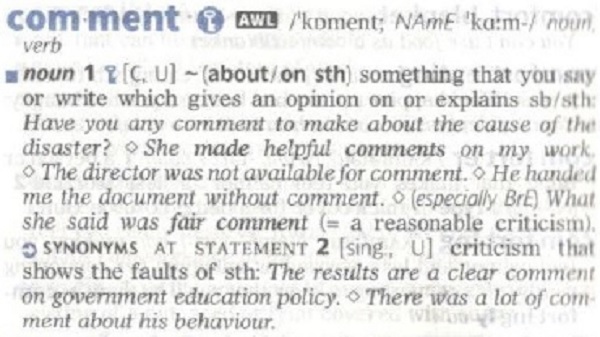
(scanned and reproduced from New 9th
Edition Oxford Advanced Learner’s
Dictionary)
17. Learned Revenue counsel submits that this practice will be avoided in the days to come.
18. In the considered view of this Court, stated position of the Revenue, which has been captured supra more particularly, the stated position that the sworn statements are not going to be used against the writ petitioner as set out in the counter affidavit and as captured in this order elsewhere supra by itself douses the request for cross-examination. In other words, it draws the curtains on the request for cross-examination.
19. If statements are not going to be used against the writ petitioner, it cannot be gainsaid that the persons, who made the sworn statements have to be cross-examined. Therefore, it is not necessary to further dilate into ‘NJP’ [‘Natural Justice Principle’].
20. Owing to all that have been set out supra, this Court deems it appropriate to dismiss the captioned writ petition.
21. Captioned writ petition is dismissed. Consequently, connected WMP is also dismissed. There shall be no order as to costs.




